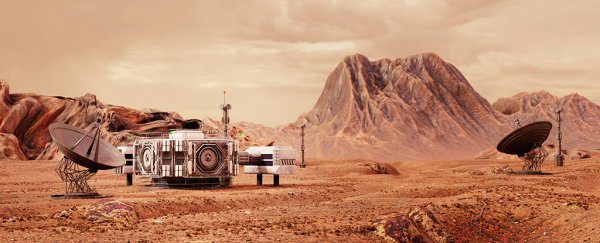There are a lot of unknowns when it comes to human beings living off-world. After all, our species has never been anywhere other than Earth, so how will we react physically and mentally if the time comes to start settling down on other planets?
A new study based on human simulations on Earth reveals some interesting insights. First, communication with the outside world – so colleagues back at base – tends to get less and less frequent over time; second, group cohesion for the space colony crew tends to improve the longer the mission continues.
That's quite promising for future settlers on the Moon, on Mars, or anywhere else. They're going to need to rely on their own initiative a lot of the time and stick together through every eventuality, which seems to be what happened here.
"The crews in such missions tend to reduce their communication with mission control during isolation, sharing their needs and problems less and less," says one of the researchers, Dmitry Shved from the Russian Academy of Sciences (RAS).
The data for the study was taken from two SIRIUS (Scientific International Research in Unique Terrestrial Station) simulations run in Russia, one covering a period of 17 days and one lasting 120 days. An artificial communications delay was added to better match what astronauts would experience on other planets and moons.
In addition to logging the frequency of contact, researchers also analyzed video messages in terms of facial expressions along with the intensity, frequency, and variability of speech patterns. The types of emotions expressed were also logged as part of the experiments.
As time went on, communication frequency decreased, except for during important mission events, such as landing simulations. Crew cohesion increased, and the communication styles of the crew converged into similar patterns, even across differences of gender and cultural background.
In the four-month simulation, for example, the number of video messages sent to mission control dropped from 200 in the first week of isolation to 115-120 in later weeks. At the same time, the duration of the video messages decreased as well.
"Our findings show that in autonomous conditions, the crews undergo psychological 'autonomization', becoming less dependent on mission control," says Shved.
"Also, the crews in such conditions tend to increase their cohesion when crew members become closer and more similar to each other, despite their personal, cultural, and other differences. So, these phenomena look promising for future solar system exploration – or for any teams living and working in isolation on Earth."
There have been several other similar experiments in recent years, including the year-long HI-SEAS (Hawaii Space Exploration Analog and Simulation) test and the MARS-500 simulation that lasted for 520 days and produced similar results to this new study.
Further simulations are already underway, including the SIRIUS-21 experiment, which is set to last for a whole eight months. By the time humans really are living on other worlds, we should have plenty of data about what to expect.
"Our findings pose serious questions that should be taken into consideration [before sending crews to the moon, Mars, and other planets]," says Shved.
"The promising part is that the crews seem to become more autonomous and independent from Earth. The increasing crew cohesion should also help them in dealing with various problems during their mission."
The research has been published in Frontiers in Psychology.
